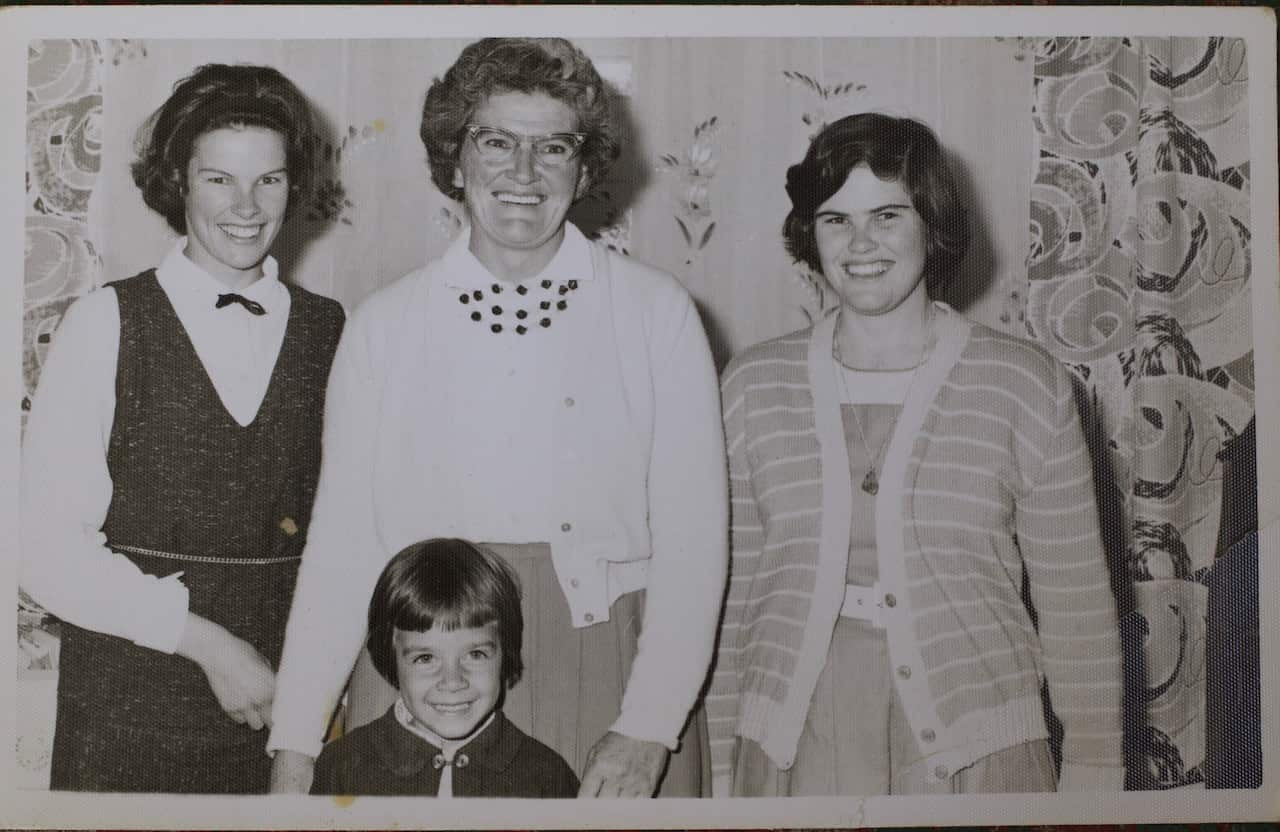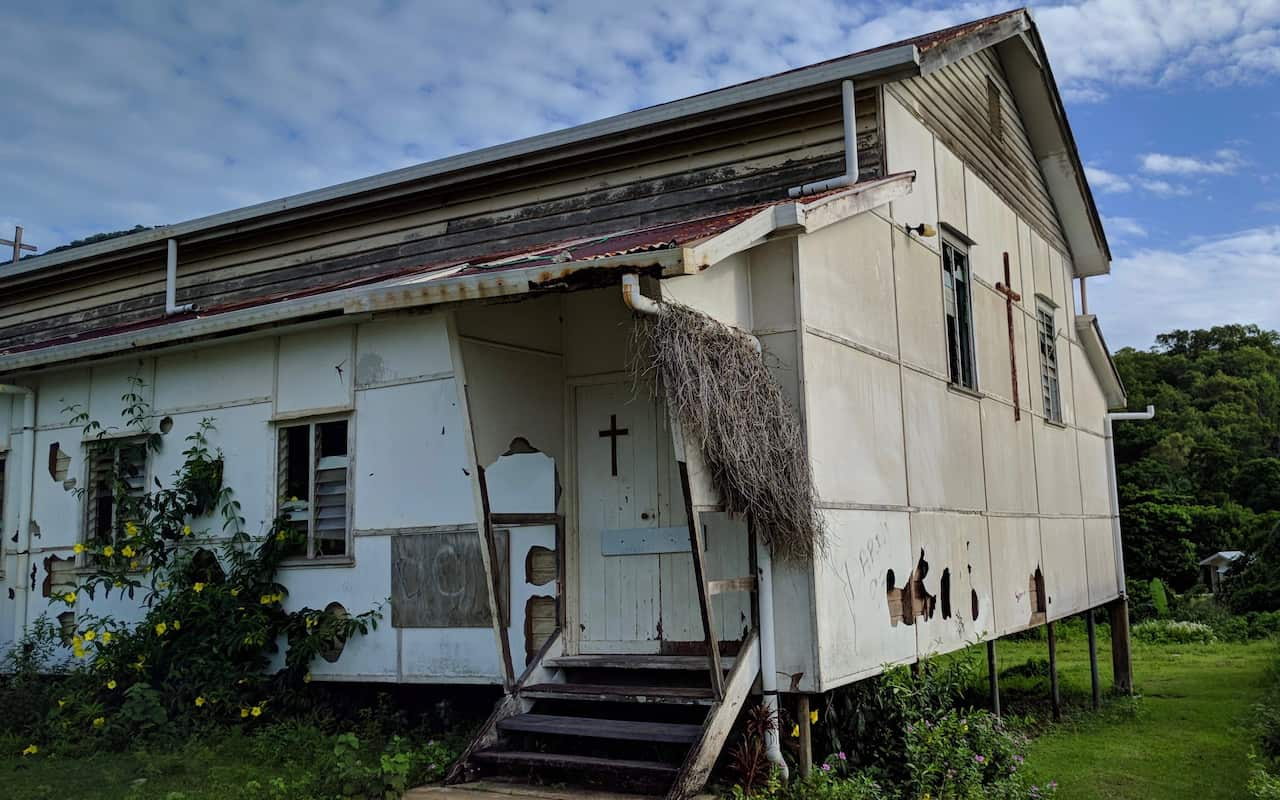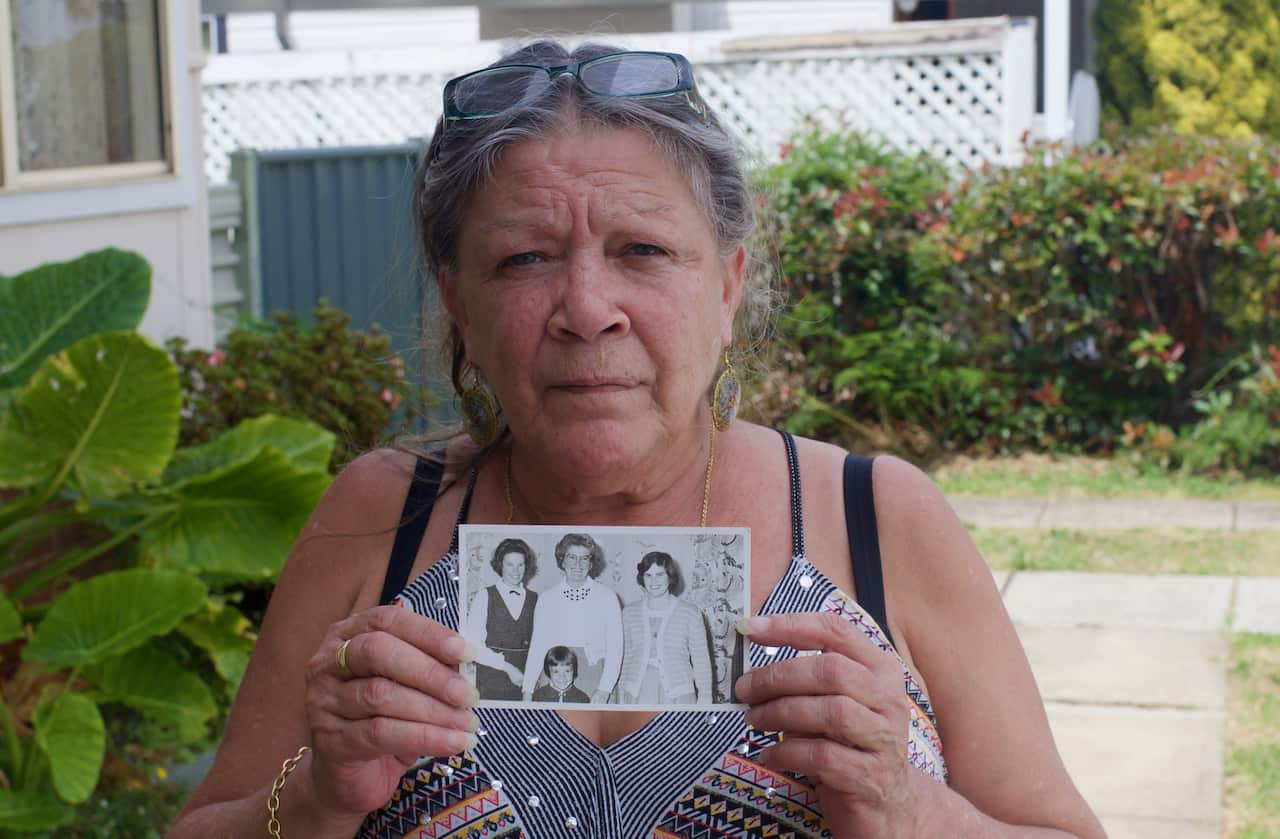“How can a child neglect itself?” says Aunty Vickie Roach as she flicks through a stack of papers on the front step of her home near Wollongong, New South Wales. “And in what alternative universe can that child be criminalized? It’s crazy”, she says, shaking her head.
Roach, a Yuin woman and respected writer and justice activist, is looking through files from her childhood in 1960s Australia, but what’s written there feels like it happened in another world.
In 1961 Roach was taken into state care after her mother asked the authorities to look after her temporarily while she went to have another child in a home for unmarried mothers. Her mother never got her back.
Instead, Roach, who was only two years old, was taken to court where she was made a state ward and given to a white foster family. What she didn’t know at the time was that as well as losing her connection to her family and culture, she had gained something: a criminal record.
“When I applied for my wardship file, the first document in that file was a charge sheet saying that I had been charged with neglect by way of destitution,” says Roach. “I was shocked, I had no idea that they could even charge a child with an offence like this.”

Vickie roach reads through her childhood court files. (Image Sylvia Rowley) Source: NITV
Systemic problem
Last year an found that thousands of innocent children and babies in Victoria were given criminal records simply for being taken into state care.
This was because the children’s court didn't differentiate properly between children who were taken into state custody because of criminal behaviour, and those taken supposedly for their own protection.
Now we can reveal that this also appears to have happened in New South Wales to people such as Roach, and likely across Australia, potentially affecting tens of thousands of people.
"So, in the court's eyes, I had been a criminal since I was two.”
“Up until 1987, children in New South Wales [who were deemed to be in need of protection] could be charged under the old Child Welfare Act of 1939 with being neglected,” says Eric Wilson SC, a lawyer who worked on these types of cases at the Western Aboriginal Legal Service in Dubbo for 12 years.
This was known as a ‘status offence’, meaning children were charged in court “not because they had done anything wrong, but because the circumstances in which they found themselves” according to the report. In Victoria and New South Wales these offences could then be recorded on police and court documents as though they were criminal offences committed by the child, and children were sent to institutions alongside young offenders.
In Victoria and New South Wales these offences could then be recorded on police and court documents as though they were criminal offences committed by the child, and children were sent to institutions alongside young offenders.

Charges given to Vickie as child continued to haunt her into adulthood. (Image Sylvia Rowley) Source: NITV News
In the case of Indigenous children, many were treated like this simply because they had been “removed or stolen because of the colour of their skin”, says Andrew Jackomos, former Commissioner for Aboriginal Children and Young People in Victoria.
Criminalising children
For Roach, being charged with being neglected as a two-year-old was the start of a downward spiral into the criminal justice system.
“It was basically the start of my criminalisation, because [after that] things that normal kids would get the wooden spoon for, or the strap, I'd have the child welfare brought in, and it would often become a charge,” says Roach.
By the time she was fourteen she had been charged twice with the offence of being ‘uncontrollable’ for running away from her foster home, and been charged for being ‘exposed to moral danger’ for having a boyfriend.
“I'd have to go to children's court,” she says. “Sometimes I got locked up. Just being on remand was bad enough, because you're in this horrible, medieval home in Glebe until you went to court.” Both the shelters where Roach was locked up while waiting to be seen in court, and the juvenile training centre she was sent to for 10 months for being ‘exposed to moral danger’, also housed young people who had actually committed crimes.
Both the shelters where Roach was locked up while waiting to be seen in court, and the juvenile training centre she was sent to for 10 months for being ‘exposed to moral danger’, also housed young people who had actually committed crimes.

Vickie Roach as a child with her foster family. (Image Sylvia Rowley) Source: NITV News
“There were some girls who were really scary in there, who had done some horrific assaults” she says.
On the strength of these childhood offences, Roach was sent to an adult prison for a first-time drug possession charge when she was seventeen.
“That would never have happened had I not had all those childhood convictions,” she says, “for being placed into care, and being criminalized for normal childhood behavior.”
The offences were also raised when she later went to court as an adult.
“There's one particular time that I specifically remember, where they said that I had antecedents going back to 1961, which, of course, is when I was two. So, in the court's eyes, I had been a criminal since I was two.”
“That first charge set the course for my life, and negatively influenced the way I was viewed by police and other authorities from then on,” she says.
In response to questions from NITV, a spokesperson from the New South Wales Department of Family and Community Services said they were now looking into the matter.
Country-wide practice
Because states borrowed heavily from each other when creating their child welfare legislation, it’s “highly likely” that children were criminalized in this way across Australia, according to Stan Winford, Associate Director at the Centre for Innovative Justice at RMIT University. “All the other states and territories had the same type of legislation up until the 90s,” he says. “Similar language was used, and similar processes and practices occurred in children’s courts in those jurisdictions.”
“All the other states and territories had the same type of legislation up until the 90s,” he says. “Similar language was used, and similar processes and practices occurred in children’s courts in those jurisdictions.”

An abandoned church on Palm Island. Stolen children were allowed out of their locked dormitories to attend services and weddings. (Sylvia Rowley) Source: NITV News/Sylvia Rowley
For example, the Western Australia of 1907, The Northern Territory of 1958-60, and the Queensland of 1911 all have strong similarities to legislation in Victoria and New South Wales. They all allowed that a police officer could “without warrant” “apprehend” a child suspected of being neglected or uncontrollable and take them into custody, before bringing them before the children’s court where they could be sentenced to an institution.
It remains to be proven whether innocent children in these other states were also given criminal records as a result of these laws, but they were certainly treated like criminals.
Prison Island
Perhaps one of the most extreme examples of this was in Queensland. Here some Indigenous children who were taken under child welfare legislation were sent away to live on a prison island.
Aboriginal reserve was set up in 1914 specifically as ‘a penitentiary for troublesome cases’, but it also housed Indigenous children sent to the island’s industrial school by the State Children’s Department as well as the Department for Native Affairs.
The shark-infested waters that surrounded it and the prison-like environment earned it a reputation as ‘Australia’s Alkatraz’. Aunty Elizabeth Clay’s father, Frederick Clay, was taken from his family in Kalkadoon country in North West Queensland and shipped to the island in the early 1930s when he was just eight-years-old.
Aunty Elizabeth Clay’s father, Frederick Clay, was taken from his family in Kalkadoon country in North West Queensland and shipped to the island in the early 1930s when he was just eight-years-old.

One of Vickie's "convictions". (Sylvia Rowley) Source: NITV News
Once on the island, her father’s life was tightly policed. “They were locked up. They had padlocks on the doors [of their dormitories]” Elizabeth Clay says. “When they were let out, they were escorted everywhere by black community police. They were treated as criminals. They weren't free to do anything.”
Victoria leads the way
In November 2017, in response to , Victorian Greens MP Nina Springle moved a motion in parliament calling on the state government to address the historic practice of wrongfully criminalising state wards.
On March 8, 2018 the Victorian government reported back, announcing that they “will take action to address a serious historical injustice which saw Victorians effectively given criminal records for needing state care as children.”
“I think it's fair to say that we're talking about thousands of people, over many decades, and the recording practices up until 1992 were just simply wrong,” Martin Pakula, the Attorney-General, said.
He also said the police records of former state wards would be corrected to remove entries to do with being taken into care, and that the government is considering a public apology.
However, many people believe this isn’t enough, arguing that a lifetime of suffering can’t be undone by altering these records now.
“I do think they should be compensated because some of the impacts of this are lifelong,” says Springle. “You've got people who are significantly impacted by societal barriers [and] systemic challenges to begin with, and then on top of that they have a criminal record that they don't deserve.”
Others believe that proper redress means making sure that young people today don’t have their lives ruined by old or irrelevant convictions. Uncle Larry Walsh, a Taungurung elder whose catalysed the government’s response to this issue, says that Victoria needs to fall in line with all other states and territories by creating a ‘spent convictions scheme’ to give young people a second chance.
Uncle Larry Walsh, a Taungurung elder whose catalysed the government’s response to this issue, says that Victoria needs to fall in line with all other states and territories by creating a ‘spent convictions scheme’ to give young people a second chance.

Larry Walsh says he was treated like a criminal for almost as long as he can remember, but he never knew why. (Image Beata Mazur) Source: Beata Mazur
Spent conviction schemes allow people with historic, low-level or irrelevant offences to stop disclosing them after a certain time period.
“I’m thankful to the government for finally realising that what they did to children in the past was wrong,” he says. “But for me it’s not just about the apology. It’s about my community’s nieces and nephews who made a mistake when they were young and have turned their lives around and now need a chance to care for their families and lead their communities.”
A daily struggle
Meanwhile, in New South Wales, Roach is still dealing daily with the fallout of a system that treated innocent children as criminals.
“Just the injustice of everything makes me want to cry all the time, you know?” says Roach. “As recently as this morning. And it’s just a real helpless, futile, impotent, anger at how wrong things can be. She hopes the New South Wales government will expunge these offenses from people’s records, and remove the police and judicial system from the process for dealing with children at risk.
She hopes the New South Wales government will expunge these offenses from people’s records, and remove the police and judicial system from the process for dealing with children at risk.

"In the court's eyes, I had been a criminal since I was two.” (Sylvia Rowley) Source: NITV News
“As for an apology, in my opinion, government apologies are demonstrably insincere,” she says. “I’d rather they righted this injustice instead.”
“Because of that neglect charge, I was in the criminal justice system already; right from then and there I had a criminal record,” Roach says. “It’s something that I've struggled with all my life, the injustice of these things. It just eats at me.”
Did you have a neglect charge or care and protection application listed on your police record like it was a crime? We want to hear about it. Get in touch with NITV News at: [email protected]
Watch The Point, 8.30pm Thursday nights on NITV, channel 34.










